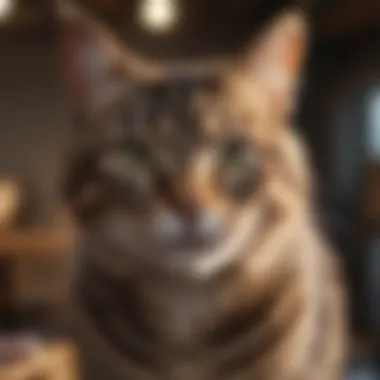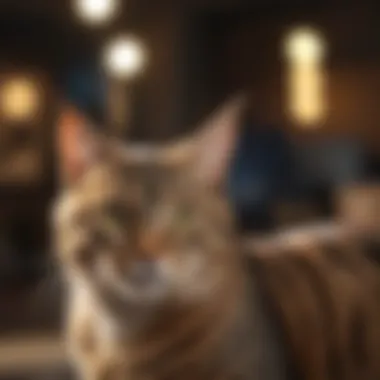Unveiling the Truth: Is Canned Tuna Suitable for Cats?


Pet Care Essentials
This article is a deep dive into the topic of whether canned tuna is suitable for feline consumption. It presents a holistic view of the potential benefits and risks associated with feeding canned tuna to cats, providing crucial insights for cat owners looking to enhance their pets' nutrition.
Daily Nutrition Requirements
When considering incorporating canned tuna into your cat's diet, it is essential to understand their daily nutritional needs. Cats are obligate carnivores, meaning their diet should primarily consist of animal-based proteins. However, canned tuna, while a source of protein, may not provide all the essential nutrients cats require for optimal health.
Exercise and Playtime
In addition to nutrition, cat owners should ensure their pets engage in adequate exercise and playtime. Regular physical activity helps maintain a healthy weight, promotes muscle tone, and prevents boredom. It is crucial to strike a balance between diet and exercise to support your cat's overall well-being.
Grooming Tips
Proper grooming is another vital aspect of cat care. While canned tuna does not directly impact grooming, ensuring your cat's coat is free from tangles and mats contributes to their overall health and comfort. Regular brushing and grooming sessions can also strengthen your bond with your feline companion.
Health and Wellness Check-ins
Regular health check-ups are crucial for monitoring your cat's well-being. When contemplating adding canned tuna to their diet, consulting with a veterinarian can provide valuable guidance. Veterinarians can offer insights on portion sizes, frequency of consumption, and potential risks associated with feeding tuna to cats.
Stay tuned as we delve deeper into the realm of cat nutrition and whether canned tuna can indeed be a beneficial addition to your feline friend's diet.
Introduction
In discussing whether canned tuna is suitable for cats, it is crucial to delve into the intricacies of feline dietary requirements. Cats are obligate carnivores, a characteristic that distinguishes them from many other animals. Their bodies are designed to thrive on a diet primarily composed of animal-based proteins and fats, making them dependent on nutrients typically found in meat. Understanding this fundamental aspect sheds light on the significance of selecting appropriate food choices for our feline companions.
Understanding Cats' Dietary Needs
Felines as Obligate Carnivores
Felines being obligate carnivores means that their biological makeup necessitates a diet rich in animal-derived nutrients for optimal health. This specialization in their dietary needs is a key consideration when evaluating the suitability of canned tuna for cats. By nature, cats lack certain enzymes crucial for efficiently processing plant-based nutrients, emphasizing the importance of providing them with meat-based proteins and fats.
Essential Nutrients for Cats
Essential nutrients play a vital role in supporting various bodily functions and promoting overall well-being in cats. From protein for muscle development to essential fatty acids for optimal coat health, understanding these requirements is integral to catering to feline nutritional needs effectively. Ensuring that canned tuna, if included in a cat's diet, meets these essential nutrient requirements is paramount for maintaining the cat's health.
Overview of Canned Tuna
Nutritional Content
The nutritional content of canned tuna is a primary consideration when assessing its viability as a dietary option for cats. Rich in protein and omega-3 fatty acids, tuna offers a substantial nutritional profile that can benefit feline health. However, it is essential to analyze the complete nutritional composition of canned tuna to ascertain its adequacy in meeting a cat's dietary requirements.


Common Preservatives in Canned Tuna
Understanding the types of preservatives used in canned tuna is essential, as it can impact the overall quality and safety of the product. While preservatives serve to extend the shelf life of tuna, their presence raises concerns regarding potential health effects on cats. Evaluating the role of preservatives in canned tuna is crucial for making informed decisions about incorporating this food item into a feline diet.
Reasons for Considering Canned Tuna
Convenience and Availability
The convenience and widespread availability of canned tuna make it an appealing option for cat owners seeking quick and easy meal solutions for their pets. However, while convenience is advantageous, careful consideration must be given to ensure that the convenience factor does not compromise the nutritional integrity of the cat's diet.
Palatability for Cats
The palatability of canned tuna is another compelling factor influencing its consideration as a dietary option for cats. Cats, known for their discerning taste preferences, may find the flavor and texture of tuna highly appealing. This palatability factor can be advantageous in encouraging cats to consume their meals consistently, but prudence is necessary to prevent overreliance on tuna in the feline diet.
Benefits of Canned Tuna for Cats
When considering the benefits of canned tuna for cats, it is crucial to acknowledge its role as a source of essential nutrients that contribute to overall feline health. Canned tuna serves as a significant source of protein and omega-3 fatty acids, both of which play vital roles in maintaining a cat's well-being. This section will delve deeper into the importance of these elements and considerations for cat owners contemplating incorporating canned tuna into their pets' diets.
Source of Protein and Omega-3 Fatty Acids
Protein's Role in Cat Health
Protein is a fundamental component of a cat's diet, serving as the building blocks for various bodily functions. It aids in muscle development, tissue repair, and enzyme production, essential for a cat's overall health. The protein content in canned tuna provides cats with a high-quality source of this crucial nutrient, supporting their growth and vitality. However, excessive intake of protein can lead to potential health implications, making moderation vital when feeding cats canned tuna.
Omega-3 Benefits for Felines
Omega-3 fatty acids are renowned for their numerous health benefits, particularly in supporting a cat's cardiovascular and cognitive functions. Canned tuna offers a rich source of omega-3 fatty acids, aiding in reducing inflammation and promoting a healthy coat and skin for felines. The inclusion of omega-3 in a cat's diet through canned tuna can bolster their immune system and contribute to their overall well-being. Nevertheless, it is essential to consider the mercury levels in tuna and opt for varieties with lower mercury content to mitigate potential risks.
Variety in Diet
Incorporating canned tuna into a cat's diet introduces novelty and diversity, enhancing the sensory experiences and nutritional intake of felines. This section will explore the significance of adding novel proteins and the texture and flavor appeal of canned tuna in ensuring a well-rounded diet for cats.
Adding Novel Proteins
Introducing novel proteins through canned tuna can mitigate diet boredom and provide cats with a diverse array of nutrients. The inclusion of different protein sources can address potential dietary deficiencies and offer felines a palate variation, encouraging healthy eating habits. However, it is crucial to monitor cats for any allergic reactions or sensitivities that may arise from new protein introductions, emphasizing the need for gradual transitions and moderation.
Texture and Flavor Appeal
The texture and flavor profile of canned tuna can pique the interest of cats, especially picky eaters, promoting mealtime enjoyment and engagement. Cats often appreciate diverse textures and flavors in their food, making canned tuna a tempting choice for enhancing the sensory experience of meals. While the appeal of canned tuna can entice cats to consume their meals enthusiastically, it is essential to balance its inclusion with other nutritional sources to maintain a balanced diet and prevent dietary imbalances or deficiencies.
Risks and Considerations


When discussing the suitability of canned tuna for cats, it is crucial to address the potential risks and considerations associated with this popular food choice. Cat owners must be vigilant about the quality of tuna they provide to their feline companions to ensure their well-being. By diving into the risks and considerations section, cat owners can make informed decisions that prioritize their cat's health above all else. This segment acts as a key informational pillar in the comprehensive guide, offering essential insights that can safeguard the feline members of the family.
Mercury Contamination
Potential Health Risks
One of the prominent aspects that warrant attention is the issue of potential health risks linked to mercury contamination in canned tuna. Felines, being sensitive creatures, are susceptible to the adverse effects of mercury exposure. The buildup of mercury in a cat's system can lead to severe health complications, including neurological issues and organ damage. Therefore, cat owners must understand the gravity of this risk and take proactive measures to mitigate exposure levels. Awareness of the specific health risks associated with mercury contamination empowers cat owners to make informed choices that prioritize their pet's well-being.
Safe Consumption Guidelines
To counter the risks posed by mercury contamination, it is imperative to adhere to safe consumption guidelines when incorporating canned tuna into a cat's diet. These guidelines outline precautionary measures that can minimize the risk of mercury exposure while still allowing cats to enjoy the nutritional benefits of tuna. By following these guidelines, cat owners can strike a balance between providing a tasty treat for their feline companions and safeguarding their long-term health. Safe consumption guidelines serve as a practical tool for cat owners to navigate the complexities of feeding canned tuna to their beloved pets.
Sodium and Additives
Adverse Effects on Cats
The presence of excessive sodium and additives in canned tuna can have detrimental effects on cats' health. High sodium levels can contribute to issues like dehydration and kidney strain in felines, underscoring the importance of monitoring sodium intake in their diet. Additionally, certain additives used in canned tuna may trigger adverse reactions in cats with sensitivities or allergies. Awareness of these potential effects empowers cat owners to make informed decisions regarding the types of tuna products suitable for their pets.
Reading Ingredient Labels
A key practice in mitigating the risks associated with sodium and additives in canned tuna is meticulous reading of ingredient labels. By scrutinizing the components of canned tuna products, cat owners can identify potential allergens or harmful additives that may harm their feline companions. Understanding how to interpret ingredient labels enables cat owners to opt for healthier and safer tuna options that align with their pets' dietary needs. Reading ingredient labels diligently is a simple yet effective strategy to ensure the well-being of cats consuming this popular seafood.
Allergic Reactions and Sensitivities
Identifying Allergies
Cat owners must remain vigilant when it comes to identifying allergic reactions and sensitivities that their pets may have towards canned tuna. Allergies can manifest in various ways in cats, ranging from mild skin irritations to severe digestive issues. By observing their cats' responses to tuna consumption, owners can pinpoint potential allergies and take appropriate actions to prevent further complications. Identifying allergies early on is instrumental in maintaining the health and comfort of feline companions.
Alternatives to Canned Tuna
In cases where cats exhibit allergic reactions or sensitivities to canned tuna, exploring alternative food options becomes imperative. Cat owners should consider alternative protein sources that meet their pets' dietary requirements while avoiding potential allergens. Additionally, opting for varied protein options ensures a balanced and nutritious diet for feline companions. By incorporating alternative foods alongside or in lieu of canned tuna, cat owners can address their pets' dietary needs while steering clear of adverse reactions. Utilizing alternatives to canned tuna underscores the importance of catering to individual cats' unique nutritional requirements.
Feeding Practices
Feeding practices play a pivotal role in ensuring the optimal health and well-being of our feline companions. As obligate carnivores, cats have specific dietary requirements that must be met through their food choices. When considering feeding practices for cats, it is essential to focus on providing a balanced diet that incorporates a variety of nutrients to support their overall health. Understanding the significance of moderation and balance in cat nutrition is key to promoting longevity and vitality in our furry friends.
Moderation and Balanced Diet
Portion Control
Portion control is a fundamental aspect of maintaining a balanced diet for cats. By managing the amount of food they consume, cat owners can prevent obesity and related health issues. Portion control helps regulate calorie intake, ensuring that cats receive the appropriate amount of nutrients without overeating. This practice also assists in monitoring food consumption, especially for cats prone to weight gain. Implementing portion control strategies involves measuring food portions accurately and adhering to recommended feeding guidelines provided by veterinarians or pet nutritionists. By controlling portions, cat owners can contribute to their cats' overall well-being and maintain a healthy weight to prevent obesity-related complications.


Supplementing with Cat Food
Supplementing with cat food is another key aspect of ensuring a balanced diet for feline friends. While commercial cat food formulations typically contain essential nutrients, supplementation can help address specific dietary requirements or preferences. By incorporating supplements such as vitamins, minerals, or specialized diets, cat owners can tailor their pet's nutritional intake to meet individual needs. Supplementing with cat food can enhance nutrient absorption, support immune function, and address any deficiencies that may arise. Additionally, supplements can cater to cats with unique health conditions or aging-related issues, promoting their overall well-being and quality of life. Pet owners should consult with veterinarians to determine the appropriate supplements and ensure they align with their cat's dietary requirements, fostering a comprehensive approach to cat nutrition.
Consulting with a Veterinarian
Seeking guidance from a veterinarian is imperative when establishing optimal feeding practices for cats. Veterinarians offer professional advice tailored to individual cats' specific needs and can provide valuable insights into maintaining a balanced diet. Through personalized nutritional recommendations and dietary guidelines, veterinarians play a crucial role in promoting feline health and well-being. Consulting with a veterinarian allows cat owners to address any dietary concerns, receive expert guidance on portion control, supplementation, and dietary adjustments, and ensure their cats' nutritional requirements are met effectively.
Professional Advice
Professional advice from veterinarians serves as a cornerstone in formulating appropriate feeding practices for cats. Veterinarians possess in-depth knowledge of feline nutrition, dietary requirements, and health implications, allowing them to offer tailored advice based on each cat's unique characteristics. By consulting with veterinarians, cat owners can gain valuable insights into crafting balanced diets, addressing dietary restrictions, and maintaining optimal health for their beloved pets. Professional advice extends beyond general feeding guidelines, encompassing specialized dietary recommendations, weight management strategies, and preventive care measures to safeguard cats' well-being.
Tailoring Diet to Individual Cats
Tailoring diets to individual cats involves customizing nutritional plans to meet each cat's specific requirements and preferences. By considering factors such as age, activity level, health status, and dietary sensitivities, cat owners can create personalized diets that cater to their cats' holistic well-being. Tailoring diets may involve adjusting portion sizes, selecting appropriate food textures, or introducing specialized diets to address health concerns. This approach allows cat owners to provide tailored nutrition that aligns with their cats' individual needs, promoting optimal health outcomes and ensuring dietary satisfaction. Tailoring diets to individual cats requires close collaboration with veterinarians to develop comprehensive dietary plans that prioritize feline health and nutritional balance.
Best Practices for Cat Nutrition
In this article, delving into the best practices for cat nutrition is paramount to ensure feline health and well-being. Proper nutrition forms the bedrock of a cat's vitality, emphasizing the significance of a balanced diet tailored to meet their dietary requirements. Cat owners must prioritize understanding the essential nutrients crucial for their cats' overall health, considering factors such as protein, fats, vitamins, and minerals. By incorporating a diverse range of food options, cat owners can optimize their feline companions' nutritional intake while offering a variety of flavors and textures to stimulate their interest in meals.
Diversifying Food Options
Rotational Feeding Benefits
Exploring rotational feeding benefits involves the practice of varying a cat's diet by introducing different types of food on a rotational basis. This strategy ensures that cats receive a spectrum of nutrients from various sources, contributing to a well-rounded diet. Rotational feeding helps prevent nutritional imbalances, minimizes the risk of developing food sensitivities, and encourages dietary flexibility in cats. By rotating between different protein sources, textures, and brands, cat owners can enhance their feline's diet diversity and promote optimal health outcomes.
Homemade Cat Food Considerations
Delving into homemade cat food considerations unveils the potential advantages and challenges of preparing cat meals at home. Crafting homemade cat food allows cat owners to have direct control over the ingredients, ensuring quality and freshness in every meal. However, creating balanced homemade cat diets requires meticulous planning to meet nutritional requirements, such as protein content, vitamins, and minerals. While homemade cat food can offer a personalized approach to nutrition, consulting with a veterinarian or feline nutritionist is crucial to formulate well-rounded recipes tailored to a cat's specific needs.
Water Intake and Hydration
Encouraging Drinking Habits
Addressing the importance of encouraging drinking habits in cats involves promoting adequate water intake to support hydration and overall health. Cats may have low thirst drive, making it essential for cat owners to provide clean, fresh water sources in multiple locations throughout their living space. Utilizing cat fountain or water bowls with running water can entice cats to drink more frequently, ensuring optimal hydration levels. Adequate water consumption aids in digestion, kidney function, and temperature regulation in felines, emphasizing the vital role of proper hydration in maintaining feline well-being.
Signs of Dehydration in Cats
Recognizing signs of dehydration in cats is imperative for early intervention and prevention of health complications. Common indicators of dehydration in cats include sunken eyes, dry or tacky gums, lethargy, and reduced skin elasticity. Monitoring daily water intake, observing litter box habits, and assessing physical symptoms can help cat owners identify dehydration promptly. Prompt veterinary attention is crucial if dehydration is suspected, as it may indicate an underlying health issue requiring immediate treatment and management.
Monitoring Cat's Health
Regular Vet Check-Ups
Prioritizing regular vet check-ups enables proactive healthcare management for cats, emphasizing preventative care and early disease detection. Routine physical examinations, dental assessments, and vaccinations form the cornerstone of feline wellness programs, ensuring cats are up-to-date on their healthcare needs. Veterinary consultations offer valuable insights into a cat's overall health status, identifying any potential concerns or conditions that require timely intervention.
Observing Behavior Changes
Keenly observing behavior changes in cats serves as a valuable way to monitor their health and well-being. Cats may exhibit subtle signs of discomfort, distress, or illness through changes in appetite, grooming habits, activity levels, and social interactions. Tracking behavior patterns and documenting any deviations from normal behaviors can aid in early detection of health issues or emotional stressors. Building a close bond with your cat allows for heightened observation of behavior changes, fostering a deeper understanding of their unique personalities and needs.







